












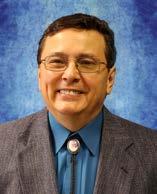
With January upon us, I want to reach out to all of you to wish you a Happy New Year and all the best for 2023. This time of the year also brings the feeling of peacefulness. When you walk outside at night, the air is crisp and clean, and you look to the sky to see the stars looking over you. Just taking a deep breath and relaxing for a bit can bring some much relief to one’s soul.
Time seems to fly by these days, and 2022 was no exception. While there have been times of joy, we also have times of sorrow—lost loved ones. As you think back on the holidays, with all the hustle and bustle, the delicious meals, and the thoughtful gifts, take a moment to remember the joyous times. Create that memory of who you were with, the laughter you shared, and joy of being with friends and family, especially our elders. Here at the Nation, our employees are an integral part of our organization. Across the board, they are here to serve the people. Whether it is products from tobacco, entertainment from the casino, or program services at the tribal offices.
As we went into the holiday season this year, beginning with Halloween, time was in short supply. Our employees decorated the entrance to their department, and the complex, with a path to each area. The kids from Turkey Ford Schools were invited over for fun, games, and candy. Everyone had a great time, and it felt good to build community involvement. The feedback from the school was nothing less than terrific.
Next was Thanksgiving, with our Title VI program creating a wonderful dinner for the Elders. To do something special for kids in our care, the Indian Child Welfare (ICW) department prepared a delicious lunch and Christmas get-together for the foster families. Even Santa made an appearance to create a memorable experience—something we will strive for each year.
Then came the Annual Christmas Party, a merry time for all. Beginning to end, the event required a lot of preparation, planning, and extra work to ensure its success. Each organization stepped up! The casino, tobacco, and other departments set up booths for the kids to participate in activities and receive gifts. Every effort was made to make sure children received a gift, even if they could not attend in person. It was heartwarming to see Tribal Members of all ages have fun, to hear their laughter, and to once again strengthen our sense of community.
The Nation set forth several initiatives in 2022, and we were able to move the needle of progress. Currently, we are in the process of another ARPA distribution to Tribal Members. Phase one of this disbursement was completed electronically, and we were able to serve over half of our members. Phase two is in the process of being rolled out via the mail.
We have continued to purchase land (390 acres so far) within our reservation as opportunities arise. The Emergency Home Project is nearing completion with a total of eight, beautiful new homes. Two previously vacant houses have also been completely refurbished and are in use. We continue to explore grants in the agriculture, housing, and cultural preservation areas with hopes to expand services.
The Casino and employees carry on providing an exceptional experience for our customers. Our General Manager constantly finds ways to keep the guests happy and the environment inviting. Things like new visual enhancements at the entrance, and new signage along the highway, have improved customer appeal.
Sadly, Tribal sovereignty continues to be attacked and chipped away. Government elections, both local and state level, affect all tribal nations in our state. The Nation is working with our brother nations more closely on various projects which will benefit all tribal nations in Northeast Oklahoma.
As we move into the new year let us strive for a better future in all things personal, cultural, and professional. I know the brightest days are ahead of us. It is an honor and privilege to serve and represent you.
Nya-Weh (thank you)
Charles Diebold, Chief of the Seneca-Cayuga NationA WORD FROM THE CHIEF
PROPOSED CONSTITUTIONAL AMENDMENTS

A GLIMPSE OF RECENT EVENTS
ACCESSING YOUR BENEFITS
PROFILE OF A MEMBER: JR HURT
NATION PROJECTS
FOOTPRINTS ON THE MILKYWAY
Charles Diebold, Chief
Curt Lawrence, 2nd Chief
Kim Guyett, Secretary-Treasurer
Cynthia Donohue Bauer, 1st Council Person
Amy Nuckolls, 2nd Council Person
Hoyit Bacon, 3rd Council Person
Tonya Blackfox, 4th Council Person
The Business Committee (BC) has re-established several committees, which include a BC member as the chairperson. They are actively collaborating on existing committees, both internal and external, to represent the Nation.
Kim Guyett (Secretary-Treasurer) is the chairperson for the Enrollment Committee.
Amy Nuckolls is the chairperson for the Housing Committee.
Cynthia Donohue Bauer is the chairperson for the Education/Welfare Committee.
Tonya Blackfox represents the Nation for the Northeastern Tribal Health System Governing Board and the Claremore Indian Hospital Board of Directors.
Curt Lawrence and Kim Guyett work with the Tax Commission.
Although the Business Committee has requested tribal members to volunteer to serve on a Constitutional Committee for input on a future rewrite of our Constitution, we believe there are five issues that need to be dealt with regarding the current version of the Constitution that simply cannot wait. You, as a member of the General Council, will soon be receiving in the mail, ballots for the Secretarial Election regarding these five proposed amendments and we want to ensure every member is aware of why these amendments are being proposed.
To amend Article IV, Section 2 of the By-Laws to change quorum for a General Council Meeting from 225 to 150 members. It is well known that since the quorum number was changed to 225 in 2014, we have had a very hard time reaching that number and when we do, we soon lose quorum by individuals leaving during the meeting. Historically, we can get and keep 150 members at the annual meeting. We feel 150 is the right number to ensure the General Council can conduct business at our annual meeting.
To amend Article III, Section 2 of the By-Laws to change the total number of General Council members it takes to request a special meeting of the General Council from 175 to 150 members. If it is going to take 150 members to conduct business, it should take no more to call a meeting.

To amend Article III of the Constitution to update and clarify qualifications to become a member of the Nation. As of today, to become a member of the Nation, a person must fall within four categories: 1. A person of Indian blood whose name appears on the original census roll; 2. Children of two people that are members; 3. Children born of a marriage of a member and a member of another tribe;
and 4. Children born of a marriage between a member and any other person, if such child is admitted by vote of the General Council.
The Business Committee is not of the opinion that a State issued marriage license should dictate our membership. We believe that proving lineage is truly the only fact that must be proven by potential members. To ensure this one fact is proven, but also to ensure that unnecessary language is never used against members or potential members in the future, this proposed amendment removes the four categories of membership and simply states “… membership of the Nation shall consist of all persons of Indian blood whose names appear on the official census roll of the Nation as of January 1, 1937 and their lineal descendants.”
This amendment is the simplest way to remove the unnecessary language and streamline the process by removing the need to put prospective membership to a vote of the General Council. If there are specific cases that need to come to General Council, they still can but there’s no need to put every new member to a vote. Also, this new language allows a prospective member to simply show lineage back to an original member and thus will allow for generational gaps.
To amend Article III of the By-Laws to require the use of Robert’s Rules of Order at all General Council and Business Committee meetings. The General Counsel has previously passed a Resolution to require Robert’s Rules to be used at all General Counsel meetings and adding a provision to our By-Laws requiring Robert’s Rules will make it a constitutional mandate.
To amend Article VIII-Annual Meetings, of the Constitution to remove specific language that was added in 2014.
Historically, we have held our elections at our annual General Council meetings. The amendments from 2014 added language pertaining to our elections that called for someone to determine if holding our elections at such meeting was “appropriate” and that BC members currently in office “shall remain in office until his/her successor is duly elected and installed in office…regardless of the resulting length of the term for such member.”
Specifically, we want to remove “provided that such election is appropriate” because this language calls for someone to make this determination other than the General Council itself. We also want to remove the language that the current BC member remain in office “until his/her successor is duly elected and installed in office.” We want to remove all of this language because, when these two provisions are combined, the Business Committee gets to determine if the election is appropriate AND the BC member would remain in office until their successors are elected and installed. So, finding the election is not appropriate, for whatever reason, would result in BC members remaining in office after their terms expire.
Under this new proposed amendment, there is no language

calling for any determination of appropriateness regarding our elections being held at the annual meeting. Also, if for any reason any of the BC positions are not voted on or if the winner of the election is not installed, that position becomes vacant after sixty days which would result in a special election being held.
All five of these proposed amendments are extremely important and are necessary to ensure the Nation’s General Council can meet and conduct business and that no administration is able to remain in office once their terms expire without re-election.
Please remember to review your ballots carefully. You will see the “Proposed Final Language” on each proposed amendment. Voting yes for one proposed amendment, doesn’t mean that you must vote yes for others. If anyone has any questions, please don’t hesitate to contact the office. Whatever the outcome, we look forward to serving you in the new year.
This is a secretarial election conducted through the BIA. A formal date for the ballots to be issued and mailed has not been set at this time.
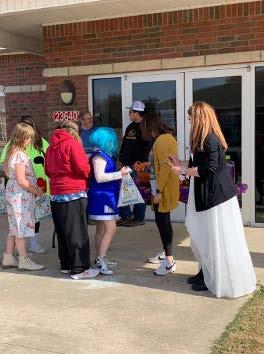

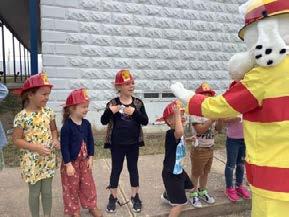
In October, Chris Arnold (our Public Safety Director) presented a Fire Prevention workshop at Turkey Ford Public Schools. Thank you to Chris and his team for their hard work and dedication to fire safety.


Snapshots from our “Walk of Treats,” which was hosted by the Seneca Cayuga Nation for Turkey Ford Schools on Friday October 28th. Each department handed out candy to the kids. We had approximately 100 ghosts and goblins visit the complex. A special thanks to the staff, children, and parents who came out. Everyone had a great time!
The Veteran’s Gourd Dance Stomp & Social happened on Saturday, November 12th. We gathered together for posting of the colors, gourd dance, dinner, a social & stomp dance, and special raffles and giveaways. It was a great evening together!

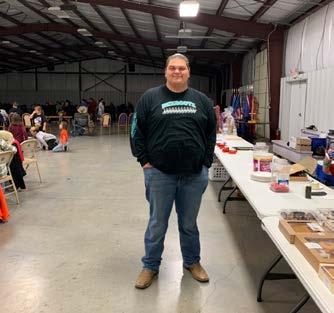
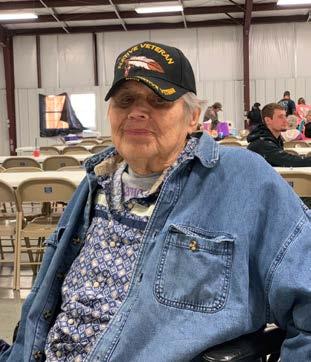

By the Numbers:
Flu Shots - 54 flu shots given out this past fall
School Clothing Applications - 1,114 (Our highest number ever!)
Covid Relief bags given out so far - 92 (First round and second round)
November was Native American Heritage Month. We honored the origins of SCN by sharing a bit of our history through Facebook posts. We were blown away by the response! Here is some of what was shared:
1934 the Indian Recognition Act played a major role in the development of federal tribal recognition.
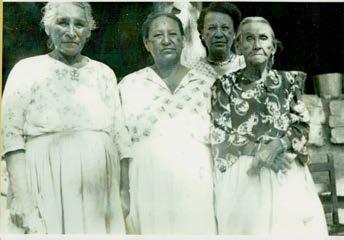
There were not enough Seneca’s or Cayuga’s to be federally recognized as separate tribes, so in 1937 we were put together and achieved federal recognition as one tribe known as The Seneca Cayuga Tribe. Our name has since been changed to The Seneca Cayuga Nation.
We are a unique people for this area because we are one of the only tribes to have held onto our original religion and ceremonial calendar. Our ceremonies are set by the seasons, plants, and the moon, with Greencorn being the only ceremony set on a calendar date. It was in the 1860s when the children were taken away to boarding school, that Greencorn got its calendar date as the first full week in August. This was done so the children could be here to attend the ceremonies before having to return to the Indian boarding schools. One of these schools was located in present-day Wyandotte. It was known as the Seneca Indian Boarding school. Some of you may have grandmas or greatgrandmas who may have even attended these schools.
The school was a Quaker-run government institution that, since its infancy, served elementary to middle school age students. The children were only allowed to return home to help with the year’s harvest. This is actually the reason why Greencorn is the only ceremony with a set calendar date.
Elders in the past have recalled it being a horrible experience, being separated from family and culture, as well as suffering mistreatments from school staff. Others, who attended the school in its later years, have expressed gratitude for the promise of a warm bed, three meals a day, and the structure a school setting provides. The school’s policies and environment changed drastically over the years, with later years being a very different experience.
We are The Seneca Cayuga Nation. We are Iroquois. We are Haudenosaunee. We are The People of the Longhouse. Although we live in Oklahoma, we originally came from New York and Canada. You will sometimes hear this referred to as “up north”. Some of our ancestral family groups migrated to Ohio from up north to avoid the Revolutionary War. Our people saw this war between Europe and the colonist as a fight between a father and son. In 1830 President Andrew Jackson signed the Indian Removal Act and our ancestors were forced to leave Ohio and come to Oklahoma.
In 1830, Oklahoma was known as Indian territory. By the time we arrived in Indian territory in 1831 many of our people had been lost along the way. A little more than 100 years later in
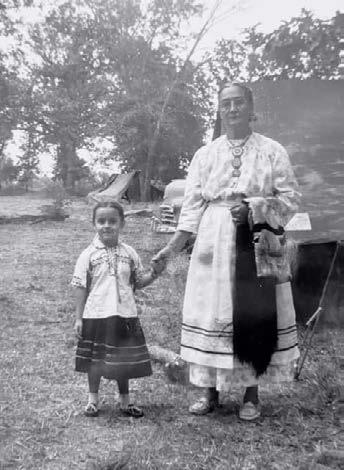
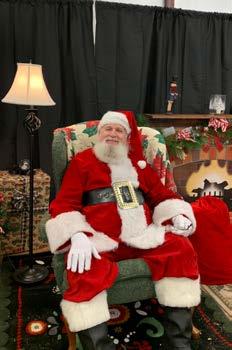


We gathered together on Saturday, December 10th for the Christmas Carnival! It was an incredible turn out and a fun day of games, activities, food, gifts, and LOTS of prizes and surprises! Thanks to all who came out and joined us. It was wonderful to celebrate the holiday season together.
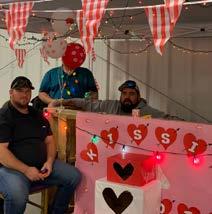



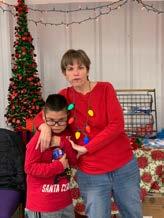
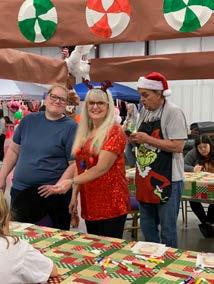

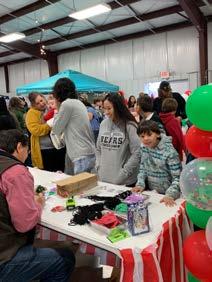
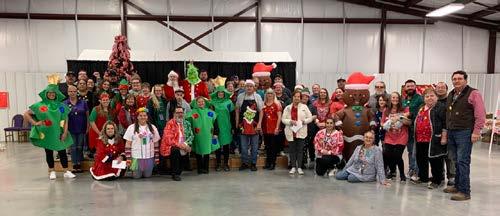
There are many benefits available to you as a member of the Seneca-Cayuga Nation. Most benefits are available to anyone, no matter where you live. A few benefits are funded by federal grants and have some limits based on geography. For a full list of benefits, visit www.sctribe.com/service/forms. Here are some highlights:
Up to $1000 per year is available to help with rent, house repairs, medical bills, or financial hardship for members between the ages of 18-54. Call the Benefits Dept. at 918-791-6025 or email benefits@sctribe.com for more information.
Up to $1,400 per year is available to help pay for hearing aids. Call the Benefits Dept. at 918-791-6025 or email benefits@sctribe.com for more information.
Up to $500 is available a year to help pay for eyeglasses or eye exams. Call the Benefits Dept. at 918-791-6025 or email benefits@sctribe.com for more information.
Money is available to help pay for dental treatment, braces, and dentures. Call the Benefits Dept. at 918-7916025 or email benefits@sctribe.com for more information.
Up to $2,500 per year is available to those 55 years or older, who have been a member of the Seneca-Cayuga Nation for no less than 20 years. Call 918-791-6015 or email benefits@sctribe.com for more information.
Money is available to help pay for funeral and burial expenses. An application must be made within six months of death. Call 918-791-6015 or email benefits@sctribe.com for more information.
Funds are available to help families have access to highquality child care. The child care program is funded by a federal grant and is limited to those living within 100 miles of Grove, OK. Contact Nikinzie Bowers at 918-791-6055.
$500 is available per student grades Pre K-12 to buy school clothing. Applications are open from July 1st to November 1st. Call Haley Buckallew at 918-791-6041 for more information.
Up to $500 is available to high school seniors to help pay for student’s cap, gown, graduation announcements, senior pictures, class ring, ACT/SAT fees, and any other seniorrelated costs associated with college entry. Call Haley Buckallew at 918-791-6041 for more information.
Scholarships are available to pay for higher education expenses. These funds can be used to attend an accredited college, university, trade, or vocational training school. Call Haley Buckallew at 918-791-6041 for more information.
NTHS is a healthcare system for all native people. Located at 7600 S. HWY 69-A Miami, OK 74354. Call (918) 5421655 for more information.

The wellness center is a 24-hour fitness facility located at the Nation’s tribal offices. It is equipped with fitness equipment, showers, and lockers. Call Mike Kerr at 918-791-6051 for more information.
The Seneca-Cayuga Nation, Grand Lake Casino, and Tobacco Company have various job openings throughout the year. For casino jobs, visit www.grandlakecasino.com/careers. For all other positions, call SCN Human Resources at 918-7916036 or 6037 to learn more.
The Food Distribution Program is a federally funded effort to provide food to qualifying households within a specific geographic area around Miami, OK. Call 918-542-3443 for more information.
Various substance abuse and mental health treatments are available to tribal members. Call Tammy Powell at 918-791-6045 for more information.
The Seneca-Cayuga Tag Office offers tags to Oklahoma Seneca-Cayuga Members. Call Tiffany White at 918-791-6028 for more information.
Seneca-Cayuga Tribal Members ages 52, along with their spouse, can eat for free at the AOA. Members of other tribes over 60 can eat for free. Anyone can buy a meal for $5. Mealtimes are 11:00 am – 12:30 pm Monday-Thursday, and 9:00 am – 10:30 am on Friday. Call Rob Gibson at 918-791-6052 for more information.
Contact Mike Kerr at 918-533-5515 for more information.
This program provides assistance for victims of domestic violence, dating violence, stalking, sexual assault, and victims of crime. Call Wendy Nichols at 918-7916057 or Kaytlynn Owens at 918-791-6059 for more information.
This program proposes to provide an avenue of hope for Seneca-Cayuga tribal children and their families by providing direct services and coordinating resources with other agencies in an attempt to prevent the breakup of Native American families. Call Kimberly Phillips at 918-791-6054 for more information.
The SORNA Coordinator maintains contact with law enforcement and monitors our CFR Court and local county jail logs for sex offenders that would fall under our jurisdiction. Call 918-791-6049 for more information.
The General Assistance Program (GAP) is funded by the Environmental Protection Agency to support the capacity building of the Department while maintaining a Tribal presence in Environmental issues impacting Tribal lands and members. This program is also funded by the EPA under the Clean Water Act Section 106. This funding allows for monthly sampling and monitoring of rivers, streams, and numerous in-lake sites, all within tribal jurisdictional boundaries. Call Sarah Lundstrum at 918-791-6033 for more information.
The Seneca Cayuga Nation has, through its Tribal Historic Preservation Officer (THPO), assumed duties of the State Historic Preservation Officer on trust lands as allowed under the National Historic Preservation Act I16 USC 470] Section 101 (d)(2). This office is partially funded by the National Park Service. Call William Tarrant at 918-791-6061 for more information.
The purpose of this program is to provide enrollment to eligible persons of the Seneca-Cayuga Nation. Call Jessica Hamilton at 918-791-6027 for more information.
Call Chris Arnold, EMT, CHPP, at 918-791-6075 for more information.
Funds are available for household repairs and rental assistance. This is a federally funded program that has geographic restrictions. Contact Michelle Morris at 918-791-6060 for more information.
If you haven’t started using Ramsey+ yet, Don’t miss out!
Our Nation’s leaders believe this online site will be beneficial to our tribal members future and promotes living in financial freedom. The video courses and tools included in each Ramsey+ membership will make it super easy for you to get started and create financial peace in your life.
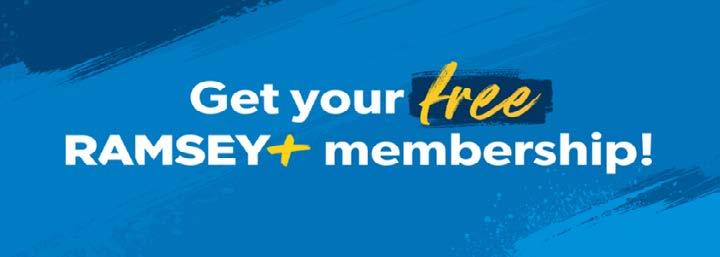
•No more sleepless nights because of money stress
•No more panic, wondering where the paycheck went
•No more money fights with your spouse
This is your chance to start fresh and learn to steward your money well.
If you have questions regarding this program, feel free to reach out to J.R. Hurt, Director of Economic Development for Seneca Cayuga Nation. 918-787-5452.
P.S. If you had a recent money win, email JRHurt@sctribe.com and let us know.
We want to celebrate with you!
Scan the QR code to get your FREE Ramsey+ Membership:

You can also type in the URL below:
https://www.ramseysolutions.com/ramseyplus/ hosts/senecacayuga?pc=38875000
TThe Substance Abuse Program might just be the most important and underutilized resource the Seneca-Cayuga Nation provides—not just to our own Tribal Members, but to any member of a federally-recognized Tribe. This free program is run by veteran counselor, Kormah Dorko, with great help from Administrative Assistant, Tamara Powell. Together, they are able to offer a comprehensive list of services, from alcohol & drug education, to referrals, to prevention & early intervention tactics.
Mr. Dorko began working for SCN in 2018, his latest position in a counseling career that began back in 2005. Since taking the reins, Mr. Dorko’s primary focus has been assisting people with anxiety, depression, and substance abuse issues.
The approach I take is integrative... We treat every person as an individual, with unique needs and circumstances,” said the counselor during a recent interview. “You could need to use cognitive therapy with some people, and EMDR (Eye Movement Desensitization and Reprocessing) with others.”
One of the major goals of SAP this year is to resurrect a substance abuse prevention and community outreach program known as BABES, or Beginning Alcohol (and Addiction) Basic Education Services. The program, which has been on pause for several years, serves as early intervention for children from 3rd to 5th grade. The aim is to teach children about tranquility, calming techniques, and better coping skills in the face of adversity. Eventually, Mr. Dorko hopes to expand after school programs and prevention activities for children of all ages.
In the meantime, the counselor also helps facilitate a summer camp geared towards young adolescences within a 50-mile radius of Sky Ranch’s “Cave Springs” in Quapaw, OK. The camp’s primary focus is outreach as a preventative strategy for substance abuse, while also incorporating cultural elements. Specific goals include: increasing substance abuse awareness, reinforcing antidrug behaviors, and providing an environment where youth can participate in alcohol and drug-free activities.
Another major facet of SAP is the awareness seminars they hold at the Substance Abuse & Counseling Center Conference room. Topics have included suicide and depression recognition, substance abuse, and managing grief.
Attending a substance abuse awareness seminar not only benefits you as an individual, it strengthens the community by raising awareness. It teaches people that substance abuse is a family and community issue, not an individual issue. Simply raising awareness can arm the community with the necessary tools that lead to higher rates of prevention and earlier intervention.
Attending a depression awareness seminar is also incredibly beneficial to the community. “There’s a common misconception that coming to counseling is a sign of weakness, but it’s not. It’s a sign of empowerment,” Kormah explains. And he believes the dialogue, which can help you better understand the warning signs of depression, is a great place to start empowering and changing minds.
Incredibly, if you do not have transportation to attend one of these events, SAP is willing to come to you. Community outreach is a top priority. “We don’t mind if it’s just 5 people. If they want to learn more about mental health and substance abuse awareness, they can take advantage of our program. We will come to you. And it’s totally free.”
It’s important to note that all of these services are available to Members of all ages, including adolescences. For members who need treatment beyond what SAP can provide, Mr. Dorko is also able to make referrals to in-patient treatment facilities like Willow Crest Hospital. Ultimately, the goal is to help Tribal Members in any way possible.
SCN is a small tribe. And we face the same mental health issues that affect a disproportionate number of Native Americans, without the same resources as some of the larger Nations. That a why program like SAP is so crucial. It has the potential to make a huge impact. We just have to take advantage of it—together. Kormah Dorko
Suicide and Crisis Lifeline: 988
With the Holidays still fresh on our minds, we’d like to highlight someone who embodied the “Christmas Spirit.” Her name was RoMere (Darling) Martin, and she made a huge impact on our Tribe.
Martin was originally born on the Potawatomi Reservation, but later married a Seneca-Cayuga member, Harold Rogers. The two met in Hollywood, where Mrs. Martin had cultivated a successful career in acting and dance, starting in the late 30s. Today, we not only remember her talent, we remember her gracious, generous, and kind heart. She truly embodied her chosen stage name—Darling.
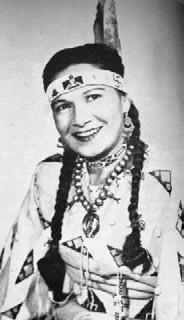

RoMere is perhaps most well-known for spearheading her charitable organization, “Box 14-A,” which took its name from RoMere’s post office box number. While altruism was her year-round pursuit, the majority of her work took place around Christmas time. Mrs. Martin and Box 14-A would help spread Christmas Cheer through the distribution of food supplies, clothing, and toys.
The project began in 1952 with four families. The following year, she had doubled it to eight. The year after that, 16. By the time of her passing in 1979, the drive had grown to serving over 300 families, about 1800 people, from 10 Tribes.
After her passing, and inspired by her generosity and dignity, volunteers continued in her footsteps for another 13 years. In fact, SCN’s Director of Historic and Cultural Preservation, Will Tarrant, has direct ties to the organization’s volunteers. His mother, Patty HarjoShinn, and grandmother, Amanda Greenback, eventually took over Box 14 A. And towards the end, Hazel Prewitt helped the run it.
Before her charity work, RoMere Darling spent a total of 21 years in Hollywood. She moved to Tiff City Missouri after she learned her husband, Nation Member Rogers had been shot down over Budapest during WW2. She would later remarry Julius Martin and together they ran a gift shop in Tiff City.
It was at this gift shop her charitable endeavors began,
starting with two girls who couldn’t attend graduation because they didn’t have formal dresses. RoMere was inspired to help after her own experiences as a child with poverty.
When her mother died during the 1918 Flu Pandemic, Martin and her four siblings were sent to the Haskell Institute, an orphanage and boarding school for Native American children. It was there she first knew what it was like to be without, especially around Christmas time. And it was the struggles of these formative years, the poverty she experienced, that drove her service to others less fortunate.
Martin’s charitable work was lauded and recognized numerous times throughout her 26 years running Box 14-A. In 1975, she received the Haskell Alumni Association’s Award for Most Outstanding Indian Woman, and later, the Joplin Sertoma Club’s Humanitarian of the Year Award. In 1972, she even received a personal letter for the President of the United States applauding her work, as well as the 15th District American Legion’s Community Service Award.
Mrs. Martin was there for our Tribe, and many others, during a time when most were not. Many of our people were struggling with extreme poverty. And many of our people, especially our children, would not have had a special Christmas without her generosity and tenacity. We hope her story continues to inspire others to follow in her footsteps.
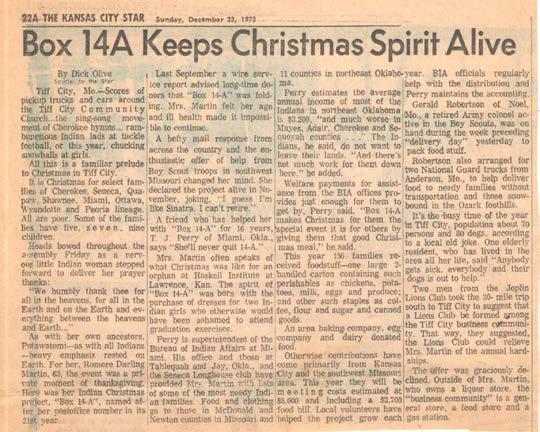
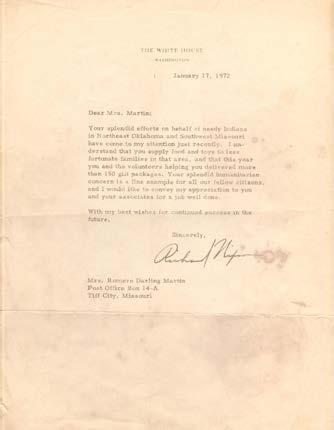

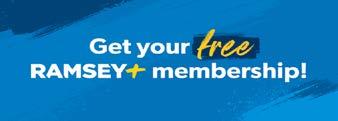

JR Hurt is a man with a plan. The Seneca Cayuga Director of Economic Development is one of the Nation’s newest employees, and he’s already making a considerable impact. We recently sat down with Mr. Hurt to talk about his history, his current position, and his hopes for the future.
JR’s unique career actually began in sports medicine. A former athlete himself, Mr. Hurt was inspired to pursue sports medicine after an experience with physical rehab following a serious injury. He began on the clinical side before eventually transitioning to operations.
Over the next 20 years, he was instrumental in running numerous multi-specialty practices. His most recent stint was with Sam Hider Health Center, a Cherokee-owned clinic. (JR is a Cherokee Tribal Member himself, and helped the Nation with business development from ‘12 - ‘14.)
Since joining the SCN team in August, Mr. Hurt has been focused on creating additional resources for the tribe. “While the various Departments operate from grants received, the Economic Development companies will generate income through businesses, either by starting new ones or acquiring existing ones,” he explains.
Having previously helped other Tribes with economic development, JR is uniquely qualified to do the same for Seneca Cayuga. He is currently developing a strategic plan for the Nation as a whole, one that aims high while staying grounded in reality.
“I asked the department heads what their department would look like if they had all the resources they wanted. How would they run it? What improvements would they make? We may not get there, but what if we get halfway there? It would make a huge difference for Tribal Members.”
This concern for the wellbeing of Tribal Members has also manifested with more tangible results. Along with the Business Committee, Mr. Hurt was instrumental in securing a year-long Rasmey+ subscription—a free and invaluable resource for Nation Members and their family. Rasmey+ gives Members the toolbox they need to successfully manage their finances. (We’ve included the sign-up link and QR code at the bottom of this article.)
Having gone through the course himself, JR believes it could really change people’s lives. “The idea behind it is really to help our tribal members manage their money instead of their money managing them. The Nation is fortunate to provide financial assistance when possible, but now we’re giving them the knowledge and tools to manage these resources.”
Resources like Ramsey+ can ultimately be used to combat the disproportionate poverty levels affecting Native American populations. Education, paired with financial assistance, is a great starting place for individuals.
For the Nation as a whole, JR has high hopes the broader strategic plan will succeed. He is already thinking about far-off projects with huge potential. “There are some great opportunities out there. And we’ll do everything we can to make them happen.”
On a personal note, Mr. Hurt is a family man and active member of the community. He and his wife Brooke share six children and three grandchildren. Together, they spend their free time coaching various sports and volunteering at their local church.
Welcome aboard JR! We’re grateful to have you.
Stailee Heard is a Seneca-Cayuga/Mvskoke/ Sac and Fox/Seminole Senior student at Sapulpa High School. We are thrilled to announce that she has signed her national letter of intent to play women’s basketball at Oklahoma State University in the fall!
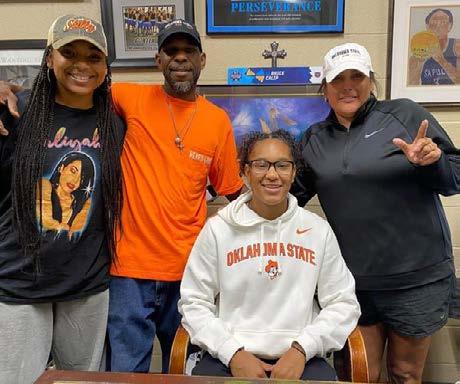
Some of her most important accolades include:
Adidas All American (Basketball)
McDonalds All-American Nominee (Basketball)
3x 1st Team Frontier Valley All Conference (Basketball)
2020 State Champion Cross-Country
2x 1st Team Frontier Valley All Conference (Volleyball)
Oklahoma All-State Volleyball
Oklahoma All-State Cross Country
Oklahoma Super 5 (Basketball)
Everyone here at SCN is wishing her the best of luck. Her dedication to her culture, family, and sports is inspiring. Stailee has even been likened to modern day Jim Thorpe— an all-around athlete that excels no matter the sport. She has put countless hours into Indian Ed, NASA, and tribal basketball leagues. Many younger students strive to be like Stailee and she makes a great indigenous mentor to all those she comes across.
We will be having Senior Night at the Chieftain Center, Sapulpa, OK on Feb 7th. The cameo videos will be played during senior night and when she departs to OSU. In fact, OSU is wanting to recruit more indigenous basketball players.
We are tremendously proud of the Stailee and all of her accomplishments. Having indigenous representation in the Big 12 is a major achievement, not just for our community, but for all Nations.


Food security and food sovereignty are top priorities for the Seneca-Cayuga Nation. This need was highlighted when the meat processing plants were forced to close during the first phase of COVID, which showed the disparity and vulnerability facing our people. Tribal governments in Oklahoma and across the country are at the forefront of developing local and sustainable food sources through farming, ranching, and meat processing. The Seneca-Cayuga Nation is pleased to announce that we are actively taking steps to address food security for our Nation through the creation of Flint Fire Ranch, our wholly-owned operation designed to raise and manage a sustainable herd of high-producing cattle.
Utilizing funds made available through ARPA, we have made an initial land purchase to create the foundation for Flint Fire Ranch. Our initial land purchase consists of two functioning ranches, hay meadow and potential feeder lot to sustain our cattle operations. Establishing a sustainable cattle herd is a long and involved process towards which we are taking a long-term approach. We have recently acquired the needed equipment for working the land and serving the needs of the herd as we prepare to make an initial investment in 40 head of cattle, the majority of which will produce calves later in the year. The timeline between starting the herd, the operation of producing meat for sale, and the distribution process is approximately one year. While it requires a lot of discipline and commitment to initiate, Flint Fire Ranch represents our Tribe’s most significant investment in food sovereignty and land acquisition in decades.
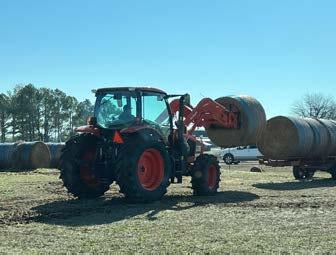
Rick Smith has been chosen to lead the herd development and day-to-day operations for Flint Fire Ranch. With more than 50 years of experience raising and managing cattle herds, Rick shared that he is, “excited to develop a cattle operation that the Tribe can be proud of. It will provide food and income for the Nation, and be recognized as the highest quality product in the market.”
Chief of the Seneca-Cayuga Nation, Chief Charlie Diebold shared, “Flint Fire Ranch illustrates the commitment of our tribe to serve the needs of our communities by advancing food sovereignty. When thinking of a name, we felt it was important to incorporate our heritage and history to this new venture. After much consideration, we chose ‘Flint Fire Ranch.’ Many identifiers and symbols in our SenecaCayuga heritage set us apart, but none stood out as much as ‘Flint Fire.’ The flint fire symbolizes many things; for many tribes and us, fire is life itself. The flint fire is created with ‘flint and steel,’ where the right spark brings the fire to life. As such, it is also ‘clean.’ No chemicals or paper are used in its creation. When the Seneca Cayuga gather in the Spring for the first dance (Sun Dance), a flint fire is built to signify the beginning. The beginning of the new growing season and to give thanks for the sun and all things the creator has provided his children. We felt the name fits the Nation very well on this endeavor for a tribal food source and are excited for what the future holds.”
Rick Smith driving the tractor.
Since breaking ground back in September, the Emergency Housing Project has progressed at lightning speed. At the time of this writing, the project is in the final stages of construction! There will be a total of eight cottages, fully furnished, each with 2 bedrooms, a kitchen, a bathroom and laundry area, as well as a carport with storage. Due to the nature of the grant used to fund the
EHP, the homes must be available for COVID-related issues at the moment. Eventually, however, the homes will not have a specific use, and the Nation will decide how they will be used in the future.
A special thank you goes out to everyone involved!
We were recently granted $167,504. This money will be used to upgrade the Community Building that is located near the Stompgrounds. This building has multiple uses. Plans are underway to upgrade, expand, and redesign the existing kitchen.
This project is just now in the planning stages, but the following are being considered:
• Higher Ceilings
• Expanding the footprint by about 10 feet
• New double refrigerator
• Commercial stove
• Exhaust system
Plans are just getting underway so stay tuned!
• Upgraded air conditioning in the Kitchen

• New flooring in the kitchen
• Higher island with new countertop
• Upgraded plumbing in bathrooms
• Ice Machine!

To show respect for our Tribal family that have passed on, we acknowledge them here today.
Steven Andrew Bighorse - 6/27/2022
Brenda Faye Sullivan - 7/1/2022
Floyd Franklin Branson III - 9/1/2022
Linda Carol Forsythe - 09/10/2022
Clifton Michael Whitetree - 10/02/2022
Emma Jade Niyu’ uh Shes Little Tarrant-Moore -10/7/2022
Timothy Notah Moreno Jr - 10/19/2022
Reuben Donald White Jr - 10/25/2022
Melissa Gaylene Paulk - 11/2/2022
Cathy Jo Hayworth - 11/4/2022
Ashley Lynn Webb - 11/7/2022
Kimberly Dee Ann Gourd - 11/8/2022
Blanche Louise Dean - 11/26/2022
Lennett Maelena Birgam - 12/21/2022
Daniel Lee Wadsworth Sr - 1/1/2023
Money is available to help pay for funeral and burial expenses. An application must be made within six months of death. Call the Benefits Department at 918-791-6025 or e-mail benefits@sctribe.com for information.






Did you know there are new Tribal ID cards? They feature a photo for enhanced security. Over time the new version of the ID card will be required for many programs and benefits. If you are over the age of 16 you must have a photo ID.
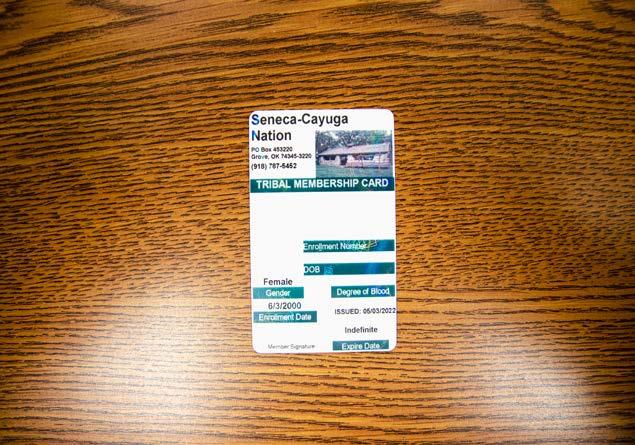
Please stop by the Enrollment office soon to upgrade to the new card!
To update your address please mail this form to”
Tribal children at this address:
If the change of address is being submitted for a minor child or incompetent adult, please sign below:
